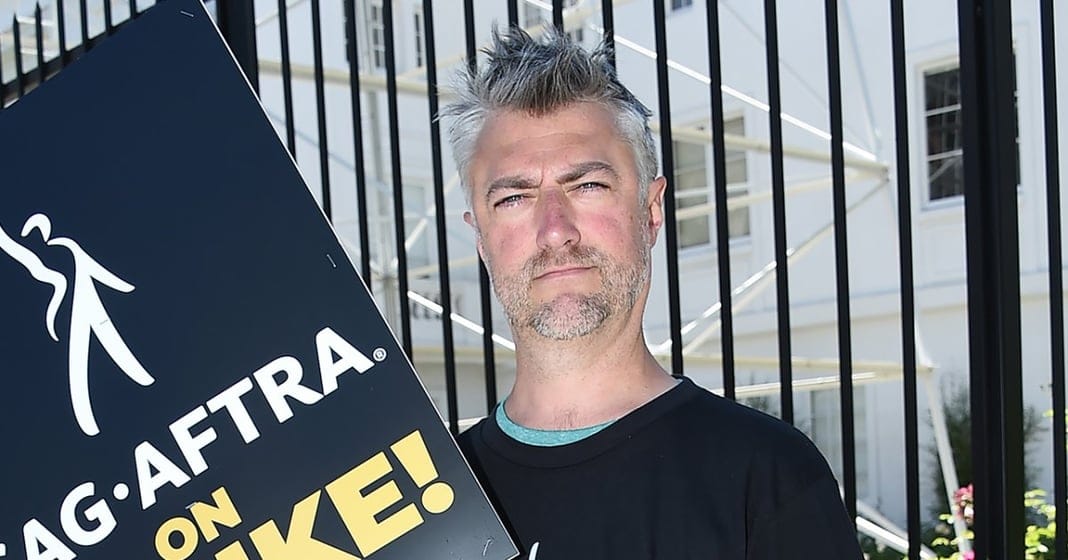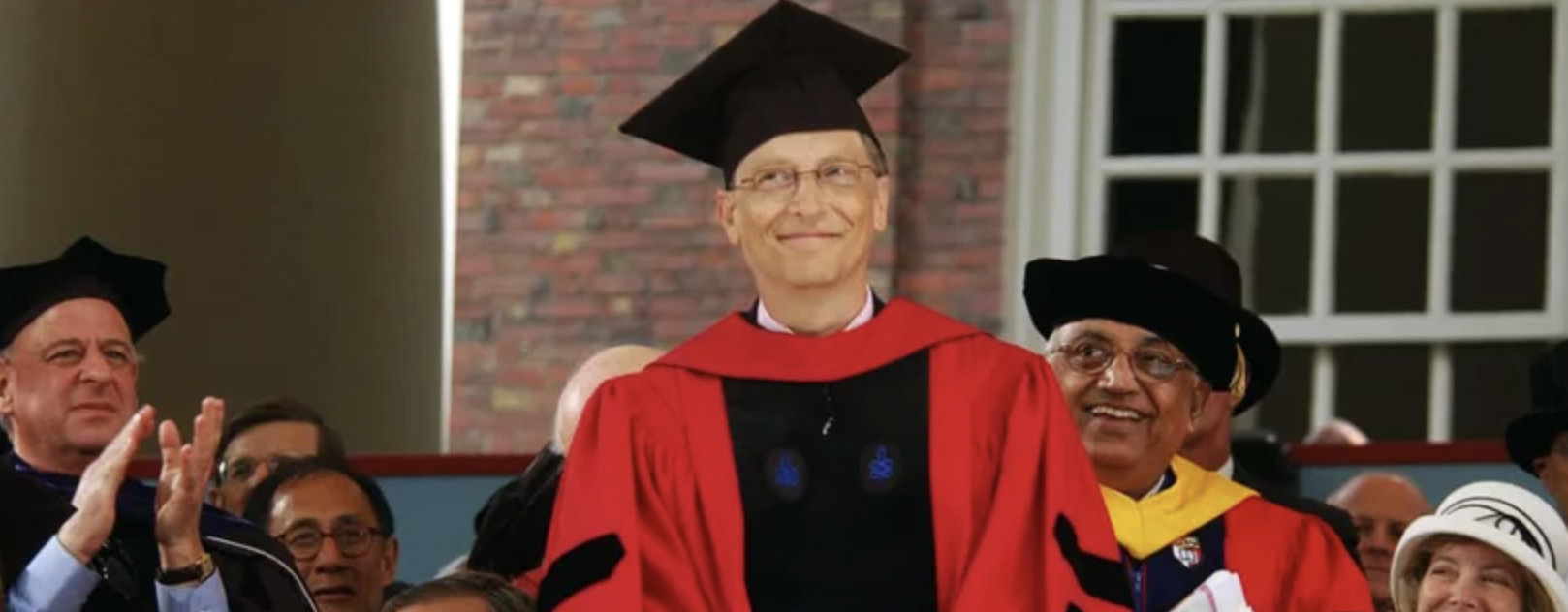Elon Musk, Bob Iger & Bill Gates: The Myth of the Self-Made Man
Why do the rich refuse to admit they just got lucky?

Hi,
Like a lot of you, I’m thoroughly enjoying The Bear — a show about a young chef who returns to Chicago to manage a restaurant after his brother passes away.
One of the people who wrote that show is 28-year-old Alex O’Keefe, who recently spoke to The New Yorker in the midst of the actors and writers strike going on in Hollywood:
During his nine weeks working in the writers’ room for “The Bear,” over Zoom, he was living in a tiny Brooklyn apartment with no heat; sometimes his space heater would blow the power out, and he’d bring his laptop to a public library. (He was never flown to set.)
He thought that he was making a lot of money, but, after reps’ fees and taxes, it didn’t add up to much. “It’s a very regular-degular, working-class existence,” he said.
“And the only future I’m seeking financially is to enter that middle class, which has always been rarified for someone who comes from poverty.”
I’ve been glued to these strikes; glued to these people who create the entertainment I binge finally go ‘we’re kind of sick of working our asses off creating these shows that make our bosses millionaires — while we keep living in freezing apartments.’
Webworm has been thinking a lot about those millionaires and billionaires this month — and a pattern we keep seeing again and again.
How no matter what — the rich refuse to admit they just got lucky.
David.
Why Do The Rich Refuse To Admit They Just Got Lucky?
by Hayden Donnell.
Disney chief executive Bob Iger makes $27 million per year, which is equal to $78,000 a day, $3250 an hour, or $54.16 a minute. A few weeks ago he stepped off his private jet into an exclusive billionaires’ retreat with Warner Bros Discovery chief executive David Zaslav and judo champion Mark Zuckerberg, where he was asked for his thoughts about actors going on strike.
“There’s a level of expectation that they have, that is just not realistic,” he told Squawk Box, in regard to the Screen Actors Guild members asking for stuff like fair pay, decent working conditions, and to not be body scanned and replaced by AI. “It’s a shame. It is really a shame.”

The actor Sean Gunn found an eloquent way to say “go fuck yourself” in response to those comments, noting that chief executives got paid around 30 times the salary of their lowest-paid workers in 1980, and that has risen to around – in Iger’s case – 400 times today.
“And I think that’s a fucking shame, Bob,” Gunn said.
“Maybe you should look in the mirror and ask yourself ‘Why is that?’. And not only ‘Why is that?’ but ‘Is that okay? Is that morally okay? Is it ethically okay that you make that much more than your lowest worker? And if so, why?’. Why is that okay?’. If your response is just that’s the way business works now, that’s the way corporations work now, well that sucks and that makes you a shitty person if that’s your answer. So you should come up with a better answer than that.”

Iger has answered that question in a roundabout way. In a 2019 appearance on The View he claimed to have earned his salary through hard work and learning from good people. “I started at the bottom and here I am,” he said. “I consider myself in some ways the American dream.”
Iger didn’t mention the help he’s received from a rigged system which syphons resources from people at the bottom to those at the top. Nor did he talk about tax avoidance, Hollywood accounting, Disney’s predatory and anti-competitive practices, or Goofy’s criminal empire*.
He’s far from alone in failing to acknowledge the mix of privilege, luck, and light exploitation that propelled him to the top. When Webworm regular Nick Mowbray is asked how he grew his plastic waste production company Zuru, he talks about making a hot air balloon toy with his brother and living on $1 a day in Hong Kong. He plays down the $20,000 they got from their mum and dad to buy themselves a plastic mould injection machine.

Bill Gates is famously a college dropout. It often goes unsaid that the college he dropped out of was Harvard, which his parents could afford because they were millionaires. It’s a similar story for Elon Musk, who got ahead by working twice as hard as everyone else (and receiving a small tidbit of South African emerald money) and Jeff Bezos, who built Amazon by “embracing the inefficiency of wandering” (and also by receiving $250,000 dollars from his parents in 1995).

Nearly every millionaire or billionaire will rattle off some hokey LinkedIn post-style spiel to explain their success. In reality, a 2021 study found the actual secret to getting rich is having parents who are rich, and using wealth and power to rig policy settings in your favour. Talent or decision-making may play a role but it’s those parental bucks that really make the difference.
The persistent power of privilege is visible in everything from the rising tide of Hollywood nepo babies, to the fact that a roided up anti-vaxxer is running a spoiler campaign for US president. But with a few notable exceptions, the beneficiaries of this privilege seem unable to acknowledge the leg-up they received by virtue of being JJ Abrams or Ron Howard’s daughter.
It’s not just Bryce Dallas Howard and billionaire moguls who can’t admit they got lucky either. New Zealand has a punishing, unremitting housing crisis, which our politicians and real estate industry-funded media outlets have been keen to tell us we’re imagining.
For a time, every second news article published here was about a young person who’d somehow been able to buy a house. The underlying message was that if you hadn’t done so yourself, your failure must be down to moral shortcoming such as an addiction to 42″ plasma TVs or “eating food”, rather than because property prices have spiralled upward in real terms for three decades straight.
That message was undermined by the fact that almost all the subjects had been helped into their home by well-off parents, whether through interest-free loans, gifts, free accommodation or literally inheriting two houses. Those factors usually got a mention around paragraph 20.
It’s offensive to say these people earned everything they’ve got. No matter how smart and savvy you think he is, Bob Iger isn’t working 1400 times harder than Disney’s cleaners. Those young people who bought houses aren’t better than the hurt and exasperated ones who filled my inbox after I wrote this article, saying they’d tried everything to get into the market and were giving up.
As the cartoonist Toby Morris illustrated succinctly in 2015, wealth is nearly always lavished on the rich, one small leg-up at a time by a grossly unequal society. Why is that so hard to admit?
Once again, resident Webworm psychotherapist Paul Wilson has some ideas. He traces the problem to no less than two fallacies, one cognitive bias, and several deeper emotional issues. The first of the fallacies – the myth of the self-made man – is a touchstone in the West, because it aligns with our capitalist cultural affinities for personal agency, he says. “It reinforces the belief that hard work and talent alone can lead to success, inspiring others to pursue their own goals.”
That individualism is augmented by a pernicious belief in a just world. Well-off people tend to say “everything happens for a reason” after overcoming an obstacle such as a sports injury**.
This idea that the world is essentially fair appeals to our need to make sense of an insensible universe. It’s frightening being a fragile meat sack clinging to a rock on the edge of space. Imagining that the uncaring dark adheres to a three-point narrative structure helps take the edge off the existential anxiety. Whether consciously or not, we know that if there’s justice to the world, then all this might mean something; we might still have a bit of control amid the chaos.

There’s something sympathetic about that. But for the people at the top, a belief in a just world can also be used as a justification for their elevation and the poor’s continued oppression.
“If people are poor, they might assume they’re lazy, incompetent, or lack moral character. This oversimplified belief system ignores the complex interplay of factors such as privilege, luck, social structures, and systemic inequalities that can significantly impact outcomes,” Wilson says.
There’s also a fundamental selfishness at play. It’s shameful to acknowledge you’re the beneficiary of systemic privilege. It’s damaging to your ego to admit you’re not a supergenius. It’s also just really nice to get treats, even if you claim you want things to be more egalitarian. And so homeowners say they didn’t lease a BMW or lay eyes on an avocado. Billionaires say they abstained from nice coffee, allowed God to direct their investments, or didn’t stop to take a shit.

If they didn’t, people might start to get angry about how many treats they’re hoarding. They might start to say they didn’t earn all their treats fair and square, or that they’re just some dumbass who bought a social media site for $44 billion and then changed its logo to look like a porn site.
They might even think it would be good to take some treats and give them to the people who don’t have any.
In Iger’s words, they might get a level of expectation that is not realistic. And that would be a shame for people like him.
A real shame.
-Hayden Donnell.
* The popular Disney character Goofy has been accused of running a global meth ring.
** The saying likely isn’t as popular with less well-off people in non-Western countries, who tend to have bad things happen to them for other people’s reasons.




